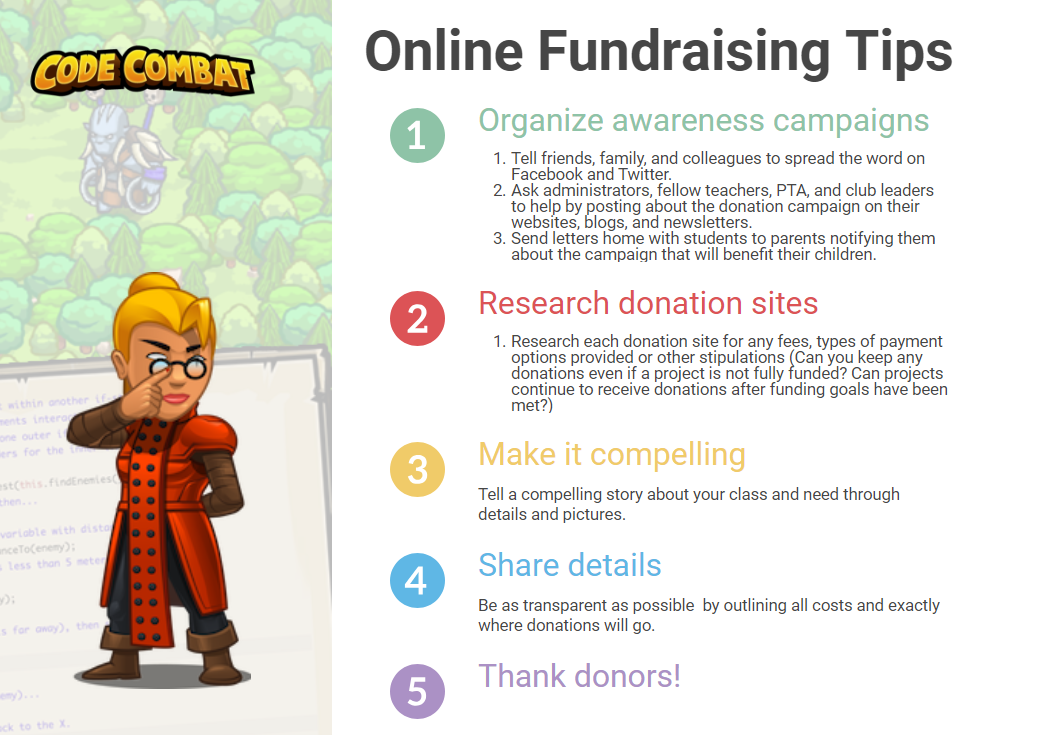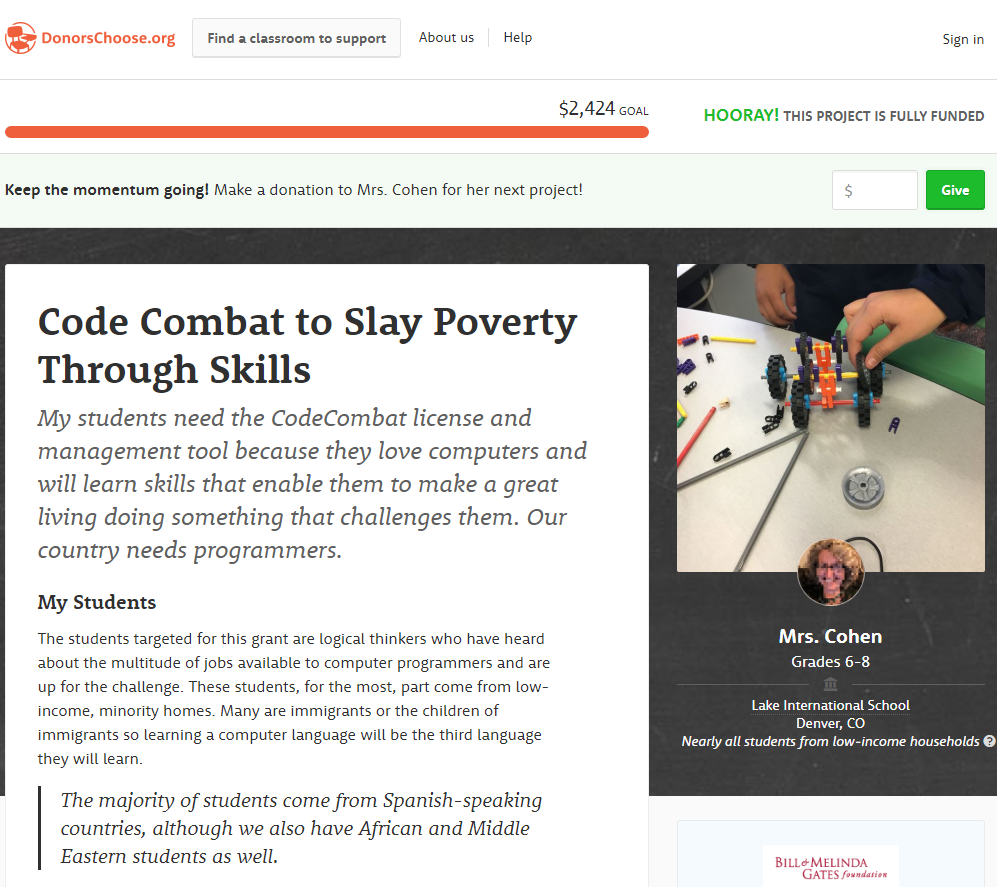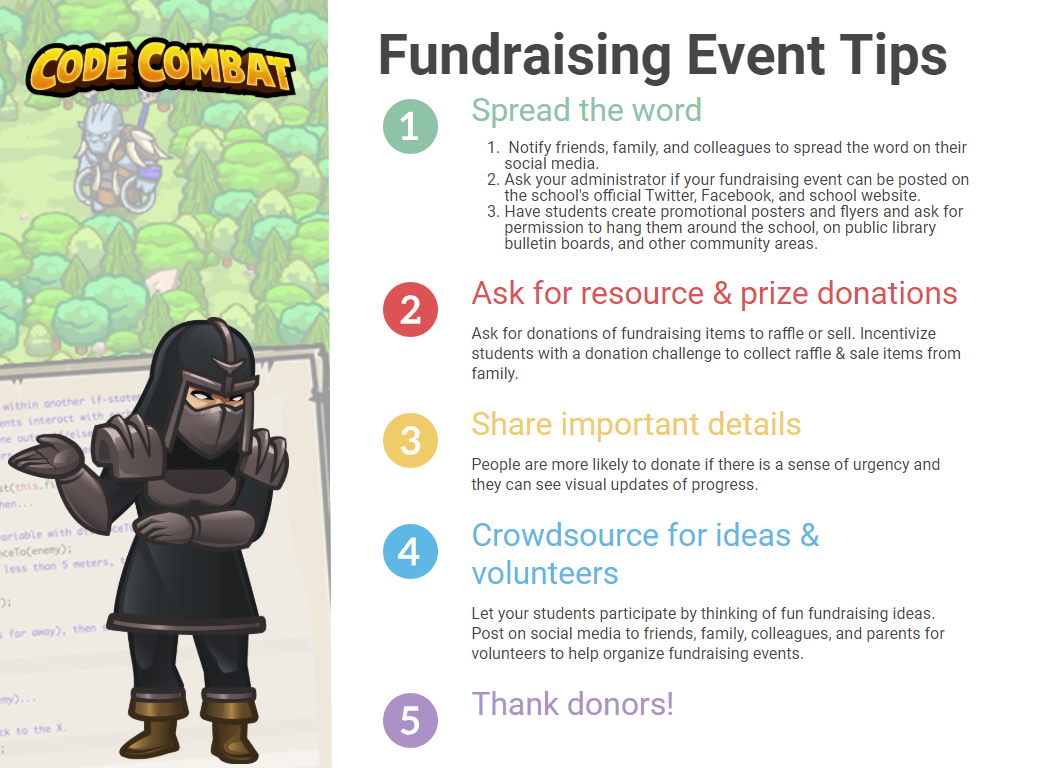Ready to begin your coding adventure and not sure how to fund it? Let us help you maneuver through the many funding opportunities available and bring computer science solutions to your class!
If you are reading this, it probably means that you tried CodeCombat’s free Introduction to Computer Science, and are now looking for ways to pay for the rest of the content. While we would love to offer our entire CodeCombat classroom platform for free, we’re a small startup with resource, staff, and server costs. Even our awesome non-profit partner, Code.org has operational costs that are only offset by tens of millions of dollars in corporate and government funds.
Still, we want to make sure every teacher who is excited about CodeCombat has the opportunity to use it, so here are our tips to help you find the funds to continue your computer science journey!

All proposals for funding - start with a plan of action. Start with your goals, objectives, and a roadmap to help focus your funding efforts. Your output will look something like this and you are welcome to use this as an example template:
"Dear XYZ,
I have three classes of students at Adventure Middle School who are thriving in my computer science course. They are meeting the rigorous goals and objectives that I have set-out for them and they are enjoying learning. The most engaging learning activities that I have facilitated in my classroom is a unique coding program called CodeCombat. The program is comprised of teacher-led lessons as well as a game-based application. The program is aligned to computer science and many mathematics standards. While there are a few free computer science programs available on the market, CodeCombat, as my students and I have experienced, is truly an effective program for teaching computer science skills.
I know that our school and district takes 21st century learning skills seriously as these are the critical “soft skills” that will serve them well for their entire academic, professional, and personal lives. The CodeCombat program was built to teach computer science skills by way of activities that encourage the practice of 21st century learning skills such as critical-thinking skills, collaboration, and creative problem-solving.
Some of the other features of the CodeCombat program that I have found to be exceptional include the following:
1) Teaches real coding skills as opposed to other programs that model coding concepts without actual code.
2) It is easy to implement. It’s student-led, scaffolded, and differentiated for the wide variety of learners in my classes and empowered me to effectively teach without prior computer science experience.
3) It has comprehensive curriculum and student tracking. It's aligned to standards, recognized by the College Board as an endorsed provider of curriculum and professional development for AP® Computer Science Principles, and has formative and summative assessments and outcome reports.
Please see the student outcome report I have attached for the free CodeCombat content that my students breezed through.
Thanks so much,
Name"

It is worth your time to write out your CodeCombat funding plan. And one of the most important places to start that plan is with your goal. A great goal and objective statement will answer these questions:
Who will be involved and who will be affected by the outcomes?
- Take ownership. I will lead the work in the classroom and acquire the data to showcase student accomplishments to parents and administration.
What problem are you solving? What do you want to accomplish?
- Having a clearly defined goal and need will tell the story to your administration of the problem that you are solving and the outcome that can come as a result. Your goal statement will serve as an opening statement in emails to your administration and should take into account your school’s priorities.
When will you start? Timeline?
- Prepare a simple roadmap or timeline that works around what you and your team/school can deliver and is flexible enough to account for unknowns.
Why is worth it?
- Showcase some data and the value proposition of the product you are asking for.
How do you plan on accomplishing the outcomes with the program vs. without it?

- Consider all of the resources necessary to find, acquire, implement, and expand the program.
- Most companies are happy to provide customized pricing and packaging options to ensure your school can assess a range of ways to procure a program.
- If you are interested in CodeCombat, you can email us at schools@codecombat.com or requesting a demo.


The easiest way to secure funding will be to explore if there are any existing funds within your school or district budget. “My school doesn’t have funding,” is a common refrain, but there are many different budget sources that might not yet have been explored.
Budget Sources:
- Yearly operating budget
- Principal’s discretionary funds
- Library budget
- Technology funds
- CTE (Perkins Grant)
- Title funds
- District funds
- Special education funds
- Professional development funds
- Gifted and talented program funds
- Undistributed district / school grant award funds
- Unspent end of school year funds
- Parent Organizations
Requesting Funds:
- Understand when school budgets are prepared so you leave everyone enough time to consider your request.
- Your first step in looking for funds should be approaching your administration. Your administration will let you know the appropriate next steps (e.g., they will approve the purchase and use of existing funds, they will direct you to reach out to the district to approve purchase and use of existing district funds, they will approve purchase but ask you to seek out the funds, etc.).
- It’s important to reach out with a clear plan and proposal outlining your class or school need and how a program like CodeCombat achieves class or school objectives. Prepare a strong goal statement explaining your request.

Grants for education are a great source of funding. With the big push for STEM education in the last few years, there is a generous amount of technology grants available.
While applying for grants takes more effort than seeking existing funds, the larger awards make up for the extra legwork.
In general it is best to reach out to administration about this type of funding as your school or district may have already been awarded funds from a relevant grant or in the process of applying. Many of these grants will also require administrative approval and participation.
Foundation & Corporate (Private Grants):
Most privately available grants from foundation or corporate sources are not eligible to individuals. You must apply as a tax-exempt 501(c)(3) non-profit (a school organization) or a 170(c)(1) government instrumentality (public school district). Some of these types of grants have a rolling application process, some have deadlines, and others do not.
- Research local community institutions for private grants (e.g. banks, retailers, utility companies, internet providers, biggest employers in the district, or other local businesses).
- Local community foundations, clubs, professional membership, and civic organizations (Rotary club, Junior League, Kiwanis, real estate councils, medical/dental associations, etc.)
- GrantwatchWatch.com: Search for state, local and foundation grants (Set the search filter to ‘teacher’)
- GetFunding.com: A free grant database with search filters for private and public grants for various grade levels in many content areas. You must register for a free account to search for grants.
- National Science Teachers Association: Filter the event calendar by ‘grants’ and the relevant grade level.
- STEM Grants: A listing of state, federal and private funds.
Government (Public Grants):
Public state and federal grants are available annually, have open and close dates and you can apply as soon as they are posted. Federal grants must be submitted on Grants.gov.
The U.S. Department of Education has a listing of their own grants with detailed information for each type of program. Each state’s Departments of Education has their own process for applying for grants - visit your state’s Department of Education site for state specific grant information.
- Grants.gov: Federal grant competitions
- U.S. Department of Education: U.S. Dept. of Ed. grant program titles
- State Departments of Education: Listing of various state contacts

Online fundraising is one of the most accessible and cost efficient ways for a teacher to secure funds. Many of our teachers have had successful campaigns on various donor/wishlist sites. Most donation sites are also easily accessible on mobile phones or apps.

Online Fundraising Sites:
- Gofundme.com: Undoubtedly the largest and most well known online funding site. While Gofundme is not teacher specific, anyone can register for an account, you will find the most donors on the site and no specific limitations on the resources you can have funded.
Sean Saucier, teacher at Polytechnic High School in Fort Worth, TX didn’t give up until he successfully bought CodeCombat to his students.

- DonorsChoose.org: Teachers post what they need for their classroom projects on the website from a dropdown list of vendors. Once projects reach their funding goal DonorsChoose sends the materials directly to the school. DonorsChoose has a very small selection of partnered vendors so teachers have to do a Special Request to vendors for CodeCombat. DonorsChoose also requires teachers to have previous experience with creating a project in order to make a Special Request.
Mrs. Cohen, teacher at Lake International Schools in Denver, Colorado was able to bring CodeCombat to her class through a successful DonorsChoose project.

More crowdfund online donation sites:
Fundraising activities and events:
Classic fundraisers that you organize yourself take work and a focused plan of action that starts with a clear set of goals and objectives (explained above). The type of fundraising activity you organize dictates the amount of time and resources necessary to run a successful campaign.

Fundraising ideas:
- Code-a-thon, build-a-thon, walk-a-thon, sing-a-thon, etc.
- Food & Craft sales
- Product or rummage sales
- Auctions of items or special experiences (e.g., Dinner with the teacher, be principal for the day, etc.)
- Raffle events
- Eating events (Pancake breakfast, spaghetti dinner, etc.)
- Box Tops
- Fundly.com fundraiser ideas: Fundly has a great list of more fundraising ideas .
No matter what avenue you pursue to fund your students’ computer science adventure, there are limitless opportunities. The first step is the easiest - if you're interested in CodeCombat, reach out to to us at schools@codecombat.com, Twitter, or request a demo.

Continue the adventure! Share your pictures, stories and feedback with us on Twitter & Facebook, join the discussion on our Forums or contribute to our open source community. Are you a teacher, CS advocate, parent or administrator? Want to blog for us? Check out this post.


